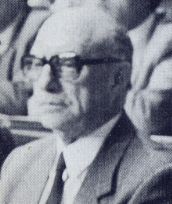Ali Shukriu
Ali Shukriu (Serbian: Али Шукрија, Ali Šukrija; 12 September 1919 – 6 January 2005) was a Serbian political figure in Kosovo, during its period as an autonomous province of Yugoslavia. An ethnic Kosovo Albanian, he served as the 2nd Chairmen of the Executive Council of SAP Kosovo from 1963 until May 1967, 2nd President of the Presidency of SAP Kosovo from August 1981 to 1982 and lastly as the 7th President of the Presidium of the League of Communists of Yugoslavia from 26 June 1984 until 25 June 1985.
Ali Shukriu | |
|---|---|
 | |
| 7th President of the Presidium of the League of Communists of Yugoslavia | |
| In office 26 June 1984 – 25 June 1985 | |
| Preceded by | Dragoslav Marković |
| Succeeded by | Vidoje Žarković |
| 2nd President of the Presidency of SAP Kosovo | |
| In office August 1981 – 1982 | |
| Preceded by | Xhavid Nimani |
| Succeeded by | Kolë Shiroka |
| 2nd Chairmen of the Executive Council of SAP Kosovo | |
| In office June 1963 – May 1967 | |
| Preceded by | Fadil Hoxha |
| Succeeded by | Ilija Vakić |
| Personal details | |
| Born | 12 September 1919 Kosovska Mitrovica, Kingdom of Serbs, Croats and Slovenes (now Kosovo)[a] |
| Died | 6 January 2005 (aged 85) Belgrade, Serbia and Montenegro |
| Nationality | Yugoslav |
| Political party | League of Communists of Kosovo |
Early life
Ali Shukriu was born in Kosovska Mitrovica, at the time part of Kingdom of Serbs, Croats and Slovenes (later Yugoslavia), and studied medicine at the University of Belgrade before the start of World War II. He joined the communist movement in 1939, was arrested in 1941, but was then able to join the partisans. after the war, he studied at the Đuro Đaković high political school of Belgrade and was public prosecutor in Kosovo in 1945.[1]
Political career
Shukriu subsequently became Serbian minister of the interior and in 1950 was a member of the Serbian parliament. In his later political career, Shukriu was vice chairman of the executive council of Kosovo, and from 1963 to May 1967 succeeded Fadil Hoxha as chairman, becoming virtual prime minister of Kosovo. Following the purge of Xhavid Nimani in August 1981, he also served briefly, until 1982, as president of the presidium. Shukriu is remembered as a particularly pro-Yugoslav politician who served Belgrade loyally in the face of a rising Albanian nationalist movement.[2] In 1989 he resigned from Kosovo's political structures during the miners' strike.
Later life
Shukriu lived the rest of his life in retirement in Belgrade until his death in 2005.[3]
Succession
| Political offices | ||
|---|---|---|
| Preceded by Dragoslav Marković |
President of the Presidium of the League of Communists of Yugoslavia 26 June 1984 – 25 June 1985 |
Succeeded by Vidoje Žarković |
| Preceded by Xhavid Nimani |
President of the Presidency of SAP Kosovo August 1981 – 1982 |
Succeeded by Kolë Shiroka |
| Preceded by Fadil Hoxha |
Chairmen of the Executive Council of SAP Kosovo June 1963 – May 1967 |
Succeeded by Ilija Vakić |
Notes
^ Kosovo is the subject of a territorial dispute between the Republic of Kosovo and the Republic of Serbia. The Republic of Kosovo unilaterally declared independence on 17 February 2008, but Serbia continues to claim it as part of its own sovereign territory. The two governments began to normalise relations in 2013, as part of the 2013 Brussels Agreement. Kosovo is currently recognized as an independent state by 97 out of the 193 United Nations member states. In total, 112 UN member states recognized Kosovo at some point, of which 15 later withdrew their recognition.
References
- Robert Elsie. Historical dictionary of Kosovo. Retrieved 26 February 2011.
- Robert Elsie. Historical dictionary of Kosovo. Retrieved 26 February 2011.
- Robert Elsie. Historical dictionary of Kosovo. Retrieved 26 February 2011.